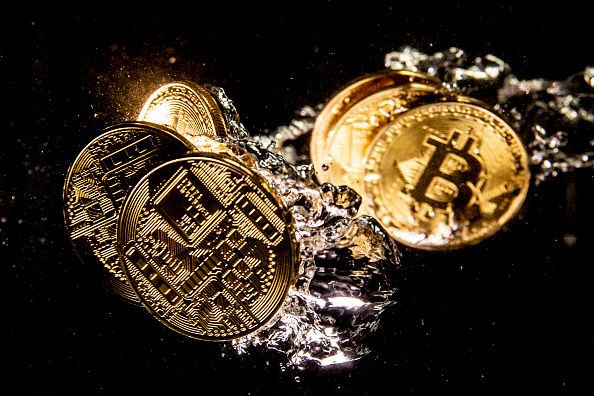Will Bitcoins' Meltdown Hurt Square's Growth?

Square (NYSE:SQ) added the ability to trade bitcoins on its Cash App in early 2018. It seemed like a lucrative growth strategy at the time, since investors were boosting the price of bitcoins to historic highs.
This article originally appeared in the Motley Fool.
However, the bubble subsequently popped, and bitcoins' price plunged about 80%. Will that meltdown hurt Square's core business of online payments and business services? Let's dig deeper into its fledgling bitcoin business to find out.
Understanding Square's bitcoin business
Square's core hardware products and software services target business customers. Its main play on the consumer market is the Cash App, which is one of the top three peer-to-peer mobile payment apps in America, alongside Zelle and Paypal Holdings' (NASDAQ:PYPL) Venmo. Square also tethers users to that platform with a physical debit card called the Cash Card.
The growth of the Cash App -- along with its Instant Deposit service, Caviar food delivery platform, and Square Capital financing arm -- supports the growth of Square's higher-margin subscription and services revenue, which surged 155% annually last quarter and accounted for 19% of its GAAP (generally accepted accounting principle) revenues.
Guggenheim analyst Jeff Cantwell estimates that Square's services could generate nearly half its revenues next year. The expansion of those services -- which also help companies manage payrolls, inventories, customer data, websites, and more -- would boost Square's revenues per customer, lock them into its ecosystem, and widen its moat against its rivals.
Square's introduction of bitcoin transactions to the Cash App gave it a unique competitive edge against Venmo and Zelle, since neither rival app offered the feature. Bitcoin trades could also complement Square's upcoming moves into the personal finance space -- which could include savings accounts and stock trades for Cash users in the near future. Simply put, Square wants Cash to evolve into an all-in-one finance app for digital transactions -- and maintaining a foothold in the crypto market seems like a smart move.
How does Square's bitcoin business work?
Square buys bitcoins for its Cash users, then adds a slight margin to the purchase price but doesn't charge additional transaction fees. Users are allowed to buy up to $10,000 in bitcoins per week, but there aren't any limits on selling.
Square notably excludes its bitcoin- and transaction-based costs from its adjusted (non-GAAP) revenues. To calculate the profits Square generates from bitcoin sales, we simply subtract its bitcoin costs from its bitcoin revenues:

Square's bitcoin revenues accounted for just 5% of its GAAP revenues last quarter, and the profits accounted for only 3% of its GAAP profits (which turned positive after the Eventbrite (NYSE:EB) IPO earlier this year). Those percentages are low, but Square's bitcoin revenues and profits are still steadily climbing on a sequential basis -- even as bitcoins' market price crumbles.
That's because Square merely acts as a bitcoin exchange instead of actually being invested in the cryptocurrency. In other words, more trades in a volatile market could boost Square's bitcoin revenues and profits more than a complacent one, regardless of the market price.
Therefore, bitcoins' ongoing meltdown shouldn't have any impact on Square's long-term growth. In a worst-case scenario, Square would simply buy fewer bitcoins as its Cash users stop trading the cryptocurrency.
It's all about growing the Cash App ecosystem
Square CEO Jack Dorsey claimed that bitcoins could become the world's "single currency" in an interview with The Times of London earlier this year. However, Square's future isn't dependent on bitcoins -- it's merely using them as a way to widen Cash's moat against the bank network-backed Zelle and PayPal's Venmo.
Cash's cumulative downloads surpassed Venmo's earlier this year, according to Sensor Tower and Nomura Instinet, which indicates that Square has a clear shot at hurting PayPal in the peer-to-peer payments space. There are certainly reasons to be cautious about Square's high-flying stock -- but tumbling bitcoin prices aren't one of them.
Leo Sun owns shares of Square. The Motley Fool owns shares of and recommends PayPal Holdings and Square. The Motley Fool has the following options: short January 2019 $82 calls on PayPal Holdings and short January 2019 $80 calls on Square. The Motley Fool has a disclosure policy.




















